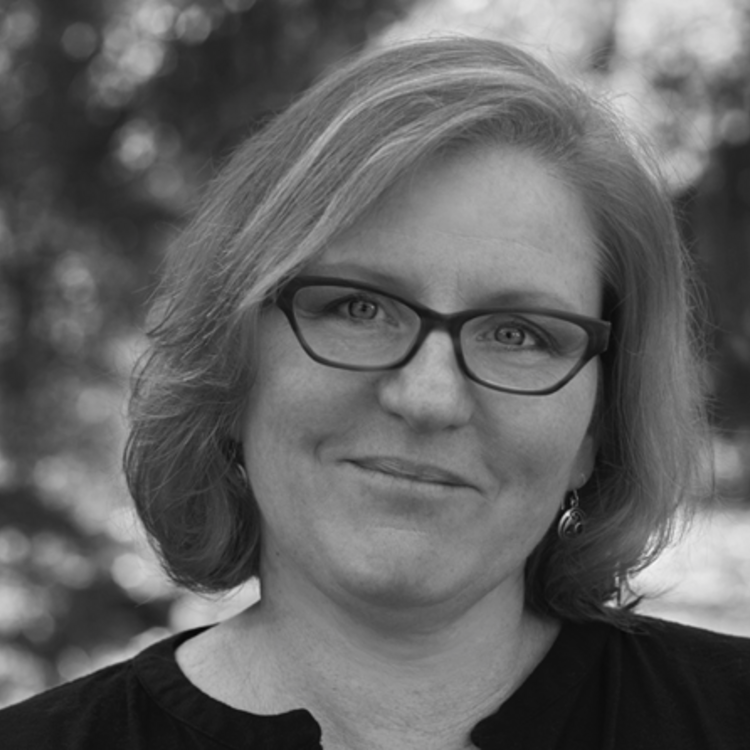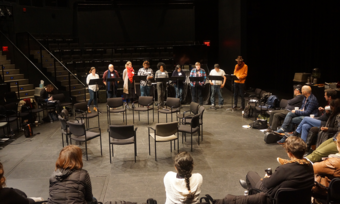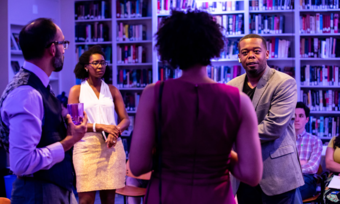The Boomerang Effect
In her interview with Matt Morrow, Tammy Ryan mentions the Pittsburgh boomerang effect. That characteristic always defines the city for me. My mom is a prime example of a Pittsburgh boomerang-er: she spent close to two decades after high school living in other cities, and then my family took over her childhood home in the South Hills. Me, the ’Burgh held onto through college. My path away from it, from Chicago to Berlin to Brooklyn, still looks like a straight line, but who knows? Boomerangs follow elliptical trajectories and I’ve always been (bad math pun alert) eccentric.
It’s been three years since I moved away, and I don’t know the Pittsburgh theater scene as intimately as those working there now. The city will always have a hold on me, though, and I have plenty to say about it as somebody who left.
The good things that the Pittsburgh-based artists contributing to HowlRound over the past week have said about making work in the city are true. While it has a thriving arts scene, it doesn’t feel like it’s near saturation; there’s room: for more art, for change, for art to stimulate change and exchange within the city’s communities. I think Pittsburgh is, ironically, more suited than the other places I’ve been living since I left to making what I consider “my kind of theater”: hyper-local theater deeply connected to place and community. To me, a place like Pittsburgh is more fertile ground for that work than a place already glutted with theater and/or overrun by transplants from other cities.
The problem is, to figure out what kind of theater I wanted to make, I had to leave.
I can’t remember the first time I wrote “creatively,” but I’m sure I was barely old enough to read. It was and remained an incredibly private act for me. Those “self-sufficient entities in their rooms with their imaginations and their desks” that Karla Boos imagines when she imagines writers? Starting out, that was me.
I was born a writer. Theater, by contrast, is what I grew into. It made me a person comfortable with myself and others, and I loved it in the way you can only love something that is other.
Theater came later than writing; those are the first experiences I can remember. I have memories of the first time I was in a play (Mary Poppins with Act One Theatre School—my penguin suit was constructed from a hula hoop). I have memories of my first “big role,” three years later: stepping out onstage—me, a shy, bookish, homeschooled eleven-year-old—looking at that audience and watching it vanish. I remember my parents’ faces during curtain call: flabbergasted, moved.
I was born a writer. Theater, by contrast, is what I grew into. It made me a person comfortable with myself and others, and I loved it in the way you can only love something that is other.
It was natural to start writing plays, and throughout high school and college, I saw a number of them performed in Pittsburgh. It remained, however, difficult to share my scripts with anyone in any form other than realized, perfect, finished—and, even then, fuck. It was hard.
Then I left Pittsburgh.
And it wasn’t until I left that I also left my room and my desk. That I stopped being so precious with my writing. Because I saw, and was encouraged to participate in, other ways of making plays.
In Chicago, I saw companies doing devised work, and I was invited into the rehearsal room as a playwright in a serious, collaborative way.
In Maine, I was pulled into community-based theater with Open Waters and experienced what it’s like when process is so thoroughly part and parcel of product.
In Germany, I saw director after director deconstruct—no, overhaul—plays. Classic plays. New plays. I saw text treated as (sometimes very cheap) material.
Not all of these different models are for me, but saying “Whoa, wait, people are doing this? This is theater, too?” has pushed me to re-evaluate and re-re-evaluate my notion of “theater” and of what it means to be a playwright.
Back in Pittsburgh, there had been little to seriously challenge my understanding of the traditional text-based theater hierarchy. There isn’t much formal variety in the ways that work is made, the ways that theater companies are structured, and the ways that theater artists work together. The ’Burgh doesn’t have a Rude Mechs, an Elevator Repair Service, a major ensemble. By and large, in Pittsburgh, you go to the theater to see a play be interpreted by a director helming designers and a one-off cast of actors.
That’s a good way to do theater. None of this is to detract from the great work that is happening or to say that the key players in Pittsburgh theater are doing anything wrong. The point is, it’s only one way of doing theater and if I’d stayed I might never have figured that out.
The Allegheny’s no better or worse than the Monongahela—they’re different rivers.
But if we didn’t have both of them, there’d be no Ohio River. And the Point would be just another riverbank.
Maybe some of the frustrations Tammy voices with the dearth of opportunity for local playwrights are related to the relative homogeneity of the Pittsburgh theater model. If you want to get your playwrights away from their desks, those playwrights have to see that it’s possible to work in other ways. The same goes for getting other theater artists in closer dialogue with playwrights.
A diverse theater ecology has the most potential to be a sustainable one.
I’d love to see Pittsburgh become a place that trains its young, aspiring theater-makers to recognize the astonishing breadth of theater as a discipline, encouraging them to experiment with broadening it further. Maybe that’s the kind of theater scene that could hold on to more of us. Because I shouldn’t know more twenty-something Pittsburghers making theater in New York City than back in Pittsburgh—but I do.
Of course, there’s the chance we’re all on a boomerang course, in which case we’d better soak up some worthwhile things to bring back.











Comments
The article is just the start of the conversation—we want to know what you think about this subject, too! HowlRound is a space for knowledge-sharing, and we welcome spirited, thoughtful, and on-topic dialogue. Find our full comments policy here